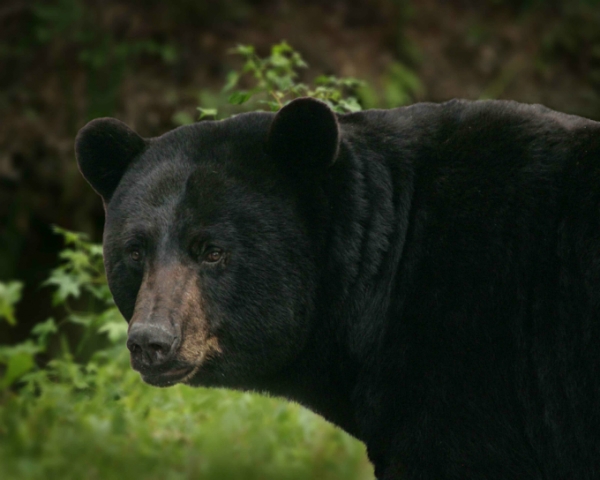Residents need to take action to prevent black bear interactions in GF
Bears have been making their presence known in Grand Forks over the last few weeks and local conservation officer, Dave Webster, says it’s becoming a real issue.
“We have been having higher than normal call volumes with problem bears,” he said.
Webster has had to destroy three “garbage bears” in the last week and a total of five bears in the last month and a half. He also said that bear-human interactions have only increased in Grand Forks – he isn’t seeing the same problem across the Boundary.
These numbers are higher than expected, especially considering some years he only destroys a total of three or four bears.
According to Webster, the main problem is with residents not cleaning up their yards by removing attractants. This includes fruit and nut trees and keeping household waste secure until collection day.
When Webster addresses a problem bear call, he talks to concerned individuals about preventing bear-human conflicts but has met with resistance. Some people have outright refused to pick up the fruit from their trees. He is now thinking he might need to take further action.
Under the Wildlife Act of BC, Webster can fine people up to $350 for not cleaning up their yards. He hasn’t done that in the past because he wants to educate people on prevention.
“I like to work with people as much as I can,” said Webster, adding that this is his community too — he lives and works here. However, the problem won’t go away if people don’t learn to change their habits.
He also said that his first concern is human safety but he is also an advocate for the bears and if people aren’t taking the necessary action to prevent conflict, something has to be done.
Residents shouldn’t bank on hibernation stopping bears from coming into town. It is possible that the issue won’t go away when the bears hibernate, because the bears might not hibernate at all.
“Bears are not going to move on until their food sources are gone,” said Webster, noting that bears are not true hibernators. If the winter is mild and there are plenty of food sources, the bears will not go into hibernation and residents will continue dealing with bear interactions even in the colder months.
“I’ve had that happen before, where they didn’t hibernate in Grand Forks,” said Webster.
Contributing factors
Removing attractants in town is the key to keeping bears out of Grand Forks, but Webster says there are other factors, like the small green bins full of meat scraps that people leave out. A shortage of food sources in the wild will play a role in pushing bears closer to town.
Bear numbers are also a factor. “A couple years ago we had a really good spring,” he said. Those bears are now young adults that are foraging for food where they can find it.
Residents don’t always understand how determined bears are and what are considered attractants.
“Bears have an incredible sense of smell,” said Webster, adding if food is available, bears will find it. This includes a freezer full of food on the back porch.
Relocating not an option
Webster is often questioned about why he doesn’t relocate the bears, instead of destroying them. For black bears, this is either a death sentence or they will return to the easy food and continue to be a danger to the public.
“People always ask me why I don’t set a live trap,” said Webster. “These are often young bears that have been pushed out of the wild. They are young, juvenile. If I take and haul them away the food sources are gone higher up (in the mountains). They will either be killed by older bears or chased out. In 48 to 72 hours they will be right back where they started.”
The bears need to eat at this time of year because they are preparing to hibernate. They can lose up to 30 per cent of their body weight during the winter so they need to eat as much as possible before hibernation.
When bears are destroyed, the carcasses are returned to the wild to be food for carrion animals. The meat from garbage bears is considered dangerous and can’t be used for human consumption.






















